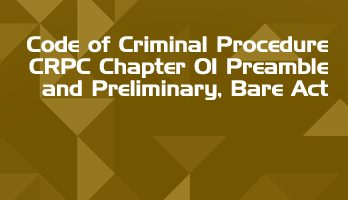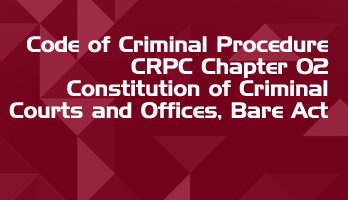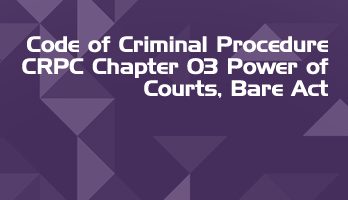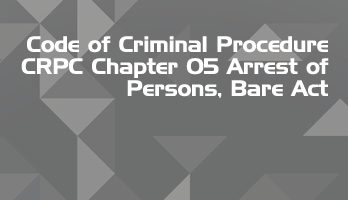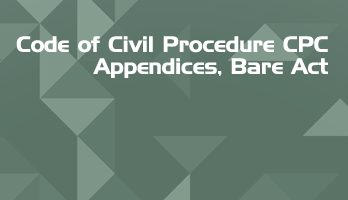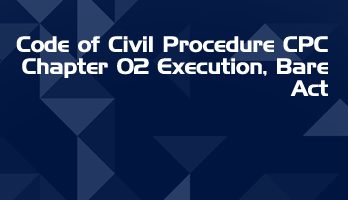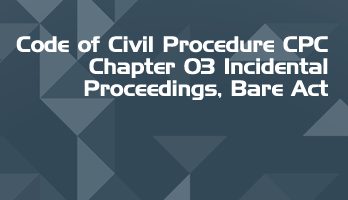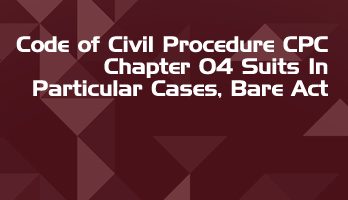A 'Bare act' is the actual legislation passed by the Parliament of India. Generally, an act sets out the high level legal and policy principles applicable to the subject matter of the law.
Most acts are accompanied by 'subsidiary legislation' such as rules, regulations, notifications and orders; which address the actual implementation detail of the act.
Free Full Course Available on LawMint's YouTube Channel
How to Land Your Dream LLB Internship in a Top Law Firm
- Part 1 - Introduction
- Part 2 - Internship Planning
- Part 3 - Internship Research
- Part 4 - Building Your Profile
- Part 5 - The Email
- Part 6 - The Resume
- Part 7 - The Cover Letter
- Part 8 - The Interview
- Part 9 - Self Development
Practical and comprehensive course, with real examples and step-by-step analysis of the complete internship application process. Check out LawMint's YouTube channel now!
Civil Procedure Code, 1908
Part XI – Miscellaneous
Section 132 – Exemption of certain women from personal appearance
- Women who, according to the customs and manners of the country, ought not to be compelled to appear in public shall be exempt from personal appearance in Court.
- Nothing herein contained shall be deemed to exempt such women from arrest in execution of civil process in any case in which the arrest of women is not prohibited by this Code.
Section 133 – Exemption of other persons
- The following persons shall be entitled to exemption from personal appearance in Court, namely –
- the President of India;
- the Vice – President of India;
- the Speaker of the House of the People;
- the Ministers of the Union;
- the Judges of the Supreme Court;
- the Governors of States and the administrators of Union Territories;
- the Speakers of the State Legislative Assemblies;
- the Chairman of the State Legislative Councils;
- the Ministers of States;
- the Judges of the High Courts; and
- the persons to whom section 87B applies.
- ***
- Where any person claims the privilege of such exemption, and it is consequently necessary to examine him by commission, he shall pay the costs of that commission, unless the party requiring his evidence pays such costs.
Section 134 – Arrest other than in execution of decree
The provisions of sections 55, 57 and 59 shall apply, so far as may be, to all persons arrested under this Code.
Section 135 – Exemption from arrest under civil process
- No Judge, Magistrate or other judicial officer shall be liable to arrest under civil process while going to, presiding in, or returning from his Court.
- Where any matter is pending before a tribunal having jurisdiction therein, or believing in good faith that it has such jurisdiction, the parties thereto, their pleader, mukhtars, revenue – agents and recognized agents, and their witnesses acting in obedience to a summons, shall be exempt from arrest under civil process other than process issued by such tribunal for contempt of Court while going to or attending such tribunal for the purpose of such matter, and while returning from such tribunal.
- Nothing in sub – section (2) shall enable a judgment – debtor to claim exemption from arrest under an order for immediate execution or where such judgment – debtor attends to show cause why he should not be committed to person in execution of a decree.
Section 135A – Exemption of members of legislative bodies from arrest and detention under civil process
- No person shall be liable to arrest or detention in prison under civil process –
- if he is a member of –
- either House of Parliament, or
- the legislative Assembly or Legislative Council of a State, or
- a Legislative Assembly of a Union territory, during the continuance of any meeting of such House of Parliament or, as the case may be, of the Legislative Assembly or the Legislative Council;
- if he is a member of any committee of –
- either House of Parliament, or
- the Legislative Assembly of a State or Union territory, or
- the Legislative council of a State, during the continuance of any meeting of such committee;
- if he is a member of –
- either House of Parliament, or
- a Legislative Assembly or Legislative Council of a State having both such Houses, during the continuance of a joint sitting, meeting, conference or joint committee of the Houses of Parliament or Houses of the State Legislature, as the case may be, and during the forty days before and after such meeting, sitting or conference.
- if he is a member of –
- A person released from detention under sub – section (1), shall, subject the provisions, of the said sub – section, be liable to re – arrest and to the further detention to which he would have been liable if he had not been released under the provisions of sub – section (1).
Section 136 – Procedure where person to be arrested or property to be attached is outside district
- Where an application is made that any person shall be arrested or that any property shall be attached under any provision of this Code not relating to the execution of decrees, and such person resides or such property is situate outside the local limits of the jurisdiction of the Court to which the application is made, the Court may, in its discretion, issue a warrant of arrest or make an order of attachment, and send to the District Court within the local limits of whose jurisdiction such person or property reside or is situate a copy of the warrant or order, together with the probable amount of the costs of the arrest or attachment.
- The District Court shall, on receipt of such copy and amount, cause the arrest or attachment to be made by its own officers, or by a Court subordinate to itself, and shall inform the Court which issued or made such warrant or order of the arrest or attachment.
- The Court making an arrest under this section shall send the person arrested to the Court by which the warrant of arrest was issued, unless he shows cause to the satisfaction of the former Court why he should not be sent to the later Court, or unless he furnishes sufficient security for his appearance before the later Court or for satisfying any decree that may be passed against him by that Court, in either of which cases the Court making the arrest shall release him.
- Where a person to be arrested or movable property to be attached under this section is within the local limits of the ordinary original civil jurisdiction of the High Court of Judicature at Fort William in Bengal or at Madras or at Bombay, the copy of the warrant of arrest or of the order of attachment, and the probable amount of the costs of the arrest or attachment, shall be sent to the Court of Small Causes of Calcutta, Madras or Bombay as the case may be, and that Court, on receipt of the copy and amount, shall proceed as if it were the District Court.
Section 137 – Language of subordinate Courts
- The language which, on the commencement of this Code, is the language of any Court subordinate to a High Court shall continue to be the language of such subordinate Court until the State Government otherwise directs.
- The State Government may declare what shall be the language of any such Court and in what character applications to and proceedings in such Court shall be written.
- Where this Court requires or allows anything other than the recording of evidence to be done in writing in any such Court, such writing may be in English; but if any party or his pleader is unacquainted with English a translation into the language of the Court shall, at his request, be supplied to him; and the Court shall make such order as it thinks fit in respect of the payment of the costs of such translation.
STATE AMENDMENTS
Rajasthan – For sub – section (3) of section 137 substitute the following: “(3) Wherever the code requires or allows anything other than the recording of evidence to be done in writing in any such court, such writing shall be in Hindi in Devanagari Script with the international from of Indian numerals. Provided that the court may in its discretion accept such writing in England on the undertaking of the party filing such writing, to file a Hindi translation of the same, within such time as may be granted by the Court and the opposite party shall have a copy of such writing in Hindi.”
Uttar Pradesh – To section 137 (3) insert the following proviso: “Provided that with effect from such date as the State Government in consultation with the High Court may by notification in the Gazette appoint, the language of every judgment, decree or order passed on made by such courts or classes of courts subordinate to the High Court and in such classes of cases as may be specified shall only be Hindi in Devanagari Script with the international form of Indian numerals”.
Section 138 – Power of High Court to require evidence to be recorded in English
- The High Court may, by notification in the Official Gazette, direct with respect to any Judge specified in the notification, or falling under a description set forth therein, that evidence in cases in which an appeal is allowed shall be taken down by him in the English language and in manner prescribed.
- Where a Judge is prevented by any sufficient reason from complying with a direction under sub – section (1), he shall record the reason and cause the evidence to be taken down in writing from his dictation in open Court.
STATE AMENDMENTS
Assam, Nagaland, Meghalaya, Tripura and Manipur – For section 138, substitute the following section – “138. Power of High Court to require evidence to be record in English – The High Court may, by notification, in the Official Gazette, direct with respect to any Judge specified in the notification, or falling under a description set forth therein that in cases in which an appeal is allowed, he shall take down, or cause to be taken down, the evidence in the English language and in the form and manner prescribed.”
Section 139 – Oath on affidavit by whom to be administered
In the case of any affidavit under this Code –
- any Court or Magistrate, or aa. any notary appointed under the Notaries Act, 1952 (53 of 1952); or
- any officer or other person whom a High Court may appoint in this behalf, or
- any officer appointed by any other Court which the State Government has generally or specially empowered in this behalf, may administer the oath to the deponent.
STATE AMENDMENTS
Uttar Pradesh – (i) for clause (b) of section 139 substitute: “(b) any person appointed in this behalf by a High Court or by a district court; or” (ii) for clause (c) of section 139 substitute: “(c) any person appointed in this behalf by such other court as the State Govt. may, by general or special order, empower in this behalf.”
Section 140 – Assessors in causes of salvage etc
- In any admiralty or vice – admiralty cause of salvage, towage or collision, the Court, whether it be exercising its original or its appellate jurisdiction may, if it thinks fit, and shall upon request of either party to such cause, summon to its assistance, in such manner as it may direct or as may be prescribed, two competent assessors; and such assessors shall attend and assist accordingly.
- Every such assessor shall receive such fees for his attendance, to be paid by such of the parties as the Court may direct or as may be prescribed.
Section 141 – Miscellaneous proceedings
The procedure provided in this Code in regard to suit shall be followed, as far as it can be made applicable, in all proceedings in any Court of civil jurisdiction.
Explanation – In this section, the expression “proceedings” includes proceedings under Order IX, but does not include any proceeding under article 226 of the Constitution.
Section 142 – Orders and notices to be in writing
All orders and notices served on or given to any person under the provisions of this Code shall be in writing.
Section 143 – Postage
Postage, where chargeable on a notice, summons or letter issued under this Code and forwarded by post, and the fee for registering the same, shall be paid within a time to be fixed before the communications made;
Provided that the State Government may remit such postage, or fee, or both, or may prescribe a scale of court – fees to be levied in lieu thereof.
Section 144 – Application for restitution
- Where and in so far as a decree or an order is varied or reversed in any appeal, revision or other proceedings or is set aside or modified in any suit instituted for the purpose the Court which passed the decree or order shall, on the application of any party entitled to any benefit by way of restitution or otherwise, cause such restitution to be made as will, so far as may be, place the parties in the position which they would have occupied but for such decree or order or such part thereof as has been varied, reversed, set aside or modified, and, for this purpose, the Court may make any orders, including orders for the refund of costs and for the payment of interest, damages, compensation and mesne profits, which are properly consequential on such variation, reversal, setting aside or modification of the decree or order. Explanation – For the purposes of sub – section (1) the expression “Court which passed the decree or order” shall be deemed to include –
- where the decree or order has been varied or reversed in exercise of appellate or revisional jurisdiction, the Court of first instance;
- where the decree or order has been set aside by a separate suit, the Court of first instance which passed such decree or order;
- where the Court of first instance has ceased to exist or has ceased to have jurisdiction to execute, it, the Court which, if the suit wherein the decree or order was passed were instituted at the time of making the application for restitution under this section, would have jurisdiction to try such suit.
- No suit shall be instituted for the purpose of obtaining any restitution or other relief which could be obtained by application under sub – section (1).
STATE AMENDMENTS
Uttar Pradesh – Substitute the following for sub – section (1) of section 144 of the Code: “(1) Where and in so far as a decree or an order is varied or reversed in appeal, revision or otherwise, the Court of first instance shall, on the application of any party entitled to any benefit by way of restitution or otherwise, cause such restitution to be made, as will, so for as may be, place the parties in the position which they would have occupied but for such decree or order or such part there of as has been varied or reversed; and for this purpose, the Court may make any orders, including orders for the refused of costs and for the payment of interest, damages, compensation and mesne profits, which are properly consequential on such variation or reversal”.
Section 145 – Enforcement of liability of surety
Where any person has furnished security or given a guarantee –
- for the performance of any decree or any part thereof, or
- for the restitution of any property taken in execution of a decree, or
- for the payment of any money, or for the fulfilment of any condition imposed on any person, under an order of the Court in any suit or in any proceeding consequent thereon, the decree or order may be executed in the manner therein provided for the execution of decree, namely –
- if he has rendered himself personally liable, against him to that extent;
- if he has furnished any property as security, by sale of such property to the extent of the security;
- if the case falls both under clauses (i) and (ii) then to the extent specified in those clauses, and such person shall, be deemed to be a party within the meaning of section 47; Provided that such notice as the Court in each case thinks sufficient has been given to the surety.
STATE AMENDMENTS
Uttar Pradesh – Substitute the following for section 145: “145. Where any person has become liable as surety or given any property as security: (a) for the performance of any decree or any part thereof, or (b) for the restitution of any property taken in execution of any decree, or (c) for the payment of any money or for the fulfilment of any condition imposed on any person, under an order of the Court in any suit or in any proceeding Consequent there on – the decree or order may be executed in the manner herein provided for the execution of decrees – (i) if he has rendered himself personally liable, against him to that extent; and (ii) if he has given any property as security, by sale of such property to the extent of the security; such person shall, for the purposes of appeal, be deemed to be a party within the meaning of section 47; Provided that such notice as the Court in each case thinks sufficient has been given to the surety. Explanation – For the purposes of this section a person entrusted by a Court with custody of any property attached in execution of any decree or order shall be deemed to have become liable as surety for the restitution of such property within the meaning of clause (b).”
Section 146 – Proceedings by or against representatives
Save as otherwise provided by this Code or by any law for the time being in force, where any proceeding may be taken or application made by or against any person then the proceeding may be taken or the application may be made by or against any person claiming under him.
Section 147 – Consent or agreement by persons under disability
In all suits to which any person under disability is a party, any consent or agreement, as to any proceeding shall, if given or made with the express leave of the Court by the next friend or guardian for the suit, have the same force and effect as if such person, were under no disability and had given such consent or made such agreement.
Section 148 – Enlargement of time
Where any period is fixed or granted by the Court for the doing of any act prescribed or allowed by this Code, the Court may, in its discretion, from time to time, enlarge such period, even though the period originally fixed or granted may gave expired.
Section 148A – Right to lodge a caveat
- Where an application is expected to be made, or has been made, in a suit or proceedings instituted, or about to be instituted, in a Court, any person claiming a right to appear before the Court on the hearing of such application may lodge a caveat in respect thereof.
- Where a caveat has been lodged under sub – section (1), the person by whom the caveat has been lodged (hereinafter referred to as the caveator) shall serve a notice of the caveat by registered post, acknowledgement due, on the person by whom the application has been or is expected to be, made, under sub – section (1).
- Where, after a caveat has been lodged under sub – section (1), any application is filed in any suit or proceeding, the Court, shall serve a notice of the application on the caveator.
- Where a notice of any caveat has been served on the applicant, he shall forthwith furnish the caveator at the caveator’s expense, with a copy of the application made by him and also with copies of any paper or document which has been, or may be, filed by him in support of the application.
- Where a caveat has been lodged under sub – section (1), such caveat shall not remain in force after the expiry of ninety days from the date on which it was lodged unless the application referred to in sub – section (1) has been made before the expiry of the said period.
Section 149 – Power to make up deficiency of court – fees
Fees – Where the whole or any part of any fee prescribed for any document by the law for the time being in force relating to court – fees has not been paid, the Court may, in its discretion, at any stage, allow the person, by whom such fee is payable, to pay the whole or part, as the case may be, of such court – fee; and upon such payment the document, in respect of which such fee is payable, shall have the same force and effect as if such fee had been paid in the first instance.
Section 150 – Transfer of business
Save as otherwise provide, where the business of any Court is transferred to any other Court, the Court to which the business is so transferred shall have the same powers and shall perform the same duties as those respectively conferred and imposed by or under this Code upon the Court from which the business was so transferred.
Section 151 – Saving of inherent powers of Court
Nothing in this Code shall be deemed to limit or otherwise affect the inherent power of the Court to make such orders as may be necessary for the ends of justice or to prevent abuse of the process of the Court.
Section 152 – Amendment of judgments, decrees or orders
Clerical or arithmetical mistakes in judgments, decrees or orders or errors arising therein from any accidental slip or omission may at any time be corrected by the Court either of its own motion or on the application of any of the parties.
Section 153 – General power to amend
The Court may at any time and on such terms as to costs or otherwise as it may think fit, amend any defect or error in any proceeding in a suit, and all necessary amendments shall be made of the purpose of determining the real question or issue raised by or depending on such proceeding.
Section 153A – Power to amend decree or order where appeal is summarily dismissed
Where an Appellate Court dismisses an appeal under rule 11 of Order XLI, the power of the Court to amend, under section 152, the decree or order appealed against may be exercised by the Court which had passed the decree or order in the first instance, notwithstanding that the dismissal of the appeal has the effect of confirming the decree or order, as the case may be, passed by the Court of first instance.
Section 153B – Place of trial to be deemed to be open Court
The place in which any Civil Court is held for the purpose of trying any suit shall be deemed to be an open Court, to which the public generally may have access so far as the same can conveniently contain them;
Provided that the presiding Judge may, if he thinks fit, order at any stage of any inquiry into or trial of any particular case, that the public generally or any particular person, shall not have access to, or be or remain in, the room or building used by Court.
Section 154 – Saving of present right of appeal
Rep. by the Repealing and Amending Act, 1952 (48 of 1952), s. 2 and Sch. I.
Section 155 – Amendment of certain Acts
Rep. by the Repealing and Amending Act, 1952 (48 of 1952), s. 2 and Sch. I.
Section 156 – Repeals
Rep. by the Second Repealing and Amending Act, 1914 (17 of 1914), s. 3 and Sch. II.
Section 157 – Continuance of orders under repealed enactments
Notifications published, declarations and rules made, places appointed, agreements filed, scales prescribed, forms framed, appointments made and powers conferred under Act 8 of 1859 or under any Code of Civil Procedure or any Act amending the same or under any other enactment hereby repealed shall, so far as they are consistent with this Code, have the same force and effect is if they had been respectively published, made, appointed, filed, prescribed, framed and conferred under this Code and by the authority empowered thereby in such behalf.
Section 158 – Reference to Code of Civil Procedure and other repealed enactments
In every enactment or notification passed or issued before the commencement of this Code in which reference is made to or to any Charter or section of Act 8 of 1859 or any Code of Civil Procedure or any Act amending the same or any other enactment hereby repealed, such reference shall, so far as may be practicable, be taken to be made to this Code or to its corresponding Part, Order, section or rule.
Important Central Acts in Regional Languages
Legislative department website also features regional language versions of several important Central Acts.
Free Full Course Available on LawMint's YouTube Channel
How to Land Your Dream LLB Internship in a Top Law Firm
- Part 1 - Introduction
- Part 2 - Internship Planning
- Part 3 - Internship Research
- Part 4 - Building Your Profile
- Part 5 - The Email
- Part 6 - The Resume
- Part 7 - The Cover Letter
- Part 8 - The Interview
- Part 9 - Self Development
Practical and comprehensive course, with real examples and step-by-step analysis of the complete internship application process. Check out LawMint's YouTube channel now!





